“The Nature of Life is to Grow” (16) Seniors and Merit
We recently visited Britney Charles’ English 12 class to see what her seniors were doing. When we arrived in her classroom, Ms. Charles was explaining to her students where they could find the study guide for their upcoming final exam. She said, “I will not be grading it, but if you do the work, it will definitely help you with the final exam, because all of that stuff will be on the exam next week.” On her information for the Final Exam Study Guide was a small sign/suggestion that said Keep Calm and Study for Final Exam. There was also a sign on the wall with a couple of very concise course goals: Become a better reader and writer, and Earn a credit. Great (and necessary) goals for GHS seniors!
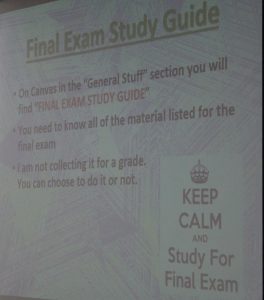
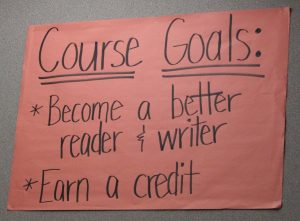
Ms. Charles stated that the class had just finished reading a graphic novel, American Born Chinese by Gene Luen Yang, and that they were going to discuss the book as a class and then spend some time working on a related writing assignment. Although graphic novels may be foreign to many adults, this book sounded intriguing. The book is about three very different characters with one simple goal; to fit in. Much of the discussion was about “stereotypes and what we expect from different people” and the character finally “acknowledging and accepting his Chinese-American heritage”. One of the character’s favorite toys was a transformer, to which one of the students said “maybe his favorite toy is a transformer because it symbolizes his transformation through the book.” They also considered the fact that some of the characters were exposed as being someone other than who they presented themselves to be when their masks came off at the end of the book.
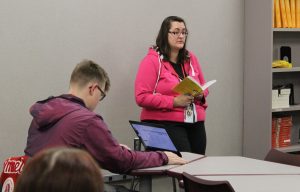
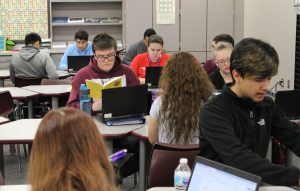
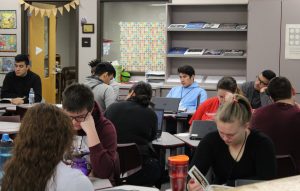
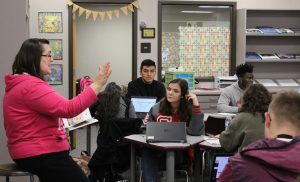
There were some students who were more engaged in the discussion than others, and who had pretty obviously enjoyed the book, because they frequently offered thoughts, ideas, and opinions to Ms. Charles’ questions. The student in the first picture below seemed especially knowledgeable about the book and the ideas and themes running through it.
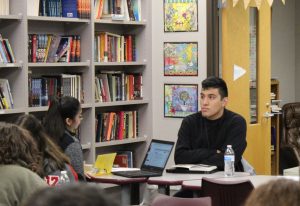
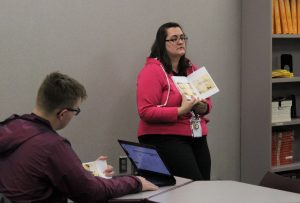
Next, Ms. Charles handed out a paper with four writing prompts on it. She noted that the assignment was already on Canvas (the program through which students and teachers communicate regarding course assignments), and that some students may have already made a copy of it from Canvas. From the four writing prompts, the students were instructed to choose one prompt from which to write their essay, and begin writing using the OEA (Observation, Evidence, and Analysis) guide. “Once your observation sentence is done let me check it with you, and then you can begin to work on evidence and analysis.” Ms. Charles also noted that “the rubric I will use to grade your essay is also on Canvas”. She encouraged the students to look at the rubric if they wanted to know what points she would be looking for in their essays.
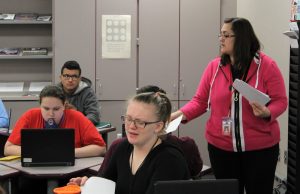
As the students worked on their observation sentences, Ms. Charles went around to give the students feedback and suggestions for refinement, so that they would be able to base their essay on a good, solid start.
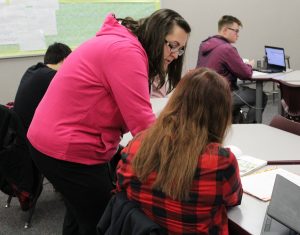
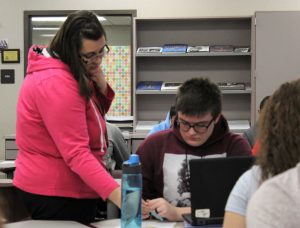
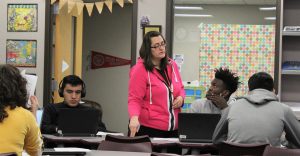
Following our visit to GHS, we went to Merit Learning Center, one of the GCS alternative learning centers. Merit is located in the old Riverdale School, which many longtime Goshen residents will remember as one of Goshen’s former elementary schools.
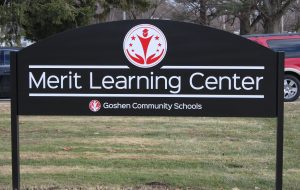
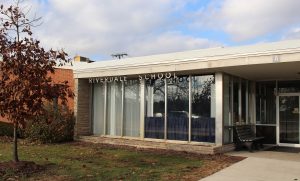
Mrs. Kim Gallagher is in her second year as the principal at Merit, and new to Merit this year, but now new to GCS, is the counselor, Viratham Mounsithiraj. Mr. Mounsithiraj, or “V” as he is called by many, has been the GHS boys soccer coach for a number of years, and came to Merit with a background in school counseling and social work.
Mrs. Gallagher said that there are approximately 200 students enrolled at Merit, and of those 200, Goshen schools has 115 of the “spots”. The numbers or “spots” beyond the 115 Goshen students are filled by students from other school systems within the county. Most of the students are classified as juniors and seniors, but there are some sophomores, and even a few freshmen. Merit offers an online learning curriculum, with certified teachers to support and assist the students. There is a morning session from 8:00-11:00 a.m., and an afternoon session from 12:00-3:00 p.m.
This year, Merit is also offering Night School to adults who wish to return to school to get their high school diploma. The students, mainly ranging in ages 19-25, may attend school on Monday-Thursday evenings from 5:00-9:00 p.m. to work on the online curriculum with supervision from certified teachers.
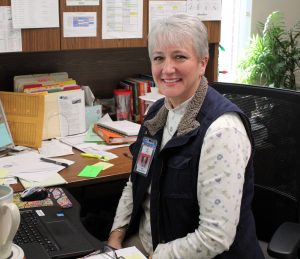
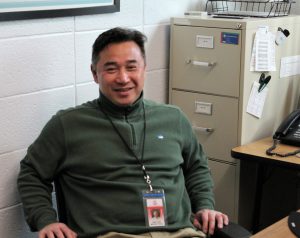
When we entered the first classroom, or Lab 1, the students were all working quietly on their computers. When they had questions or issues with their technology, they simply raised their hands and one of the teachers in the classroom got up to help them. According to the teachers, they all help all of the students. However, the teachers all have subjects with which they are more familiar, and if a student is asking about Algebra II or Science, then the teacher with the most expertise in that area will likely be the one to help with those questions.

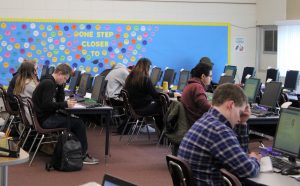
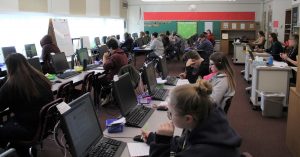
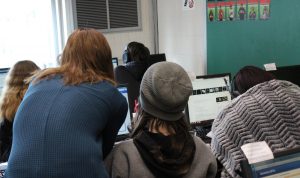
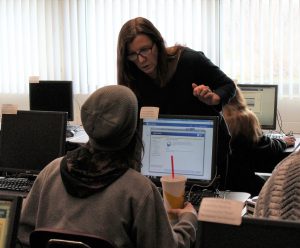
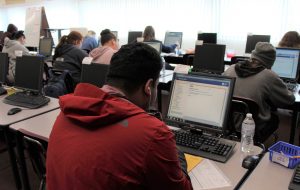
All around the school and in the classrooms are reminders of just how many credits the students have earned, and how many have finished and are ready to graduate. Their names and the class in which they earned the credit are listed on each post, and the collage of credits just keeps growing around the rooms.
According to one of the teachers, they try to keep students on pace to earn just over one credit per month, so that they can earn at least 10 credits per year. Of course, there are some students that earn many more credits than that, and some that earn less credits. “We expect the kids to take 2 quizzes per day if they are reading their units and retaining the information. That keeps them on track for earning the credit for the course….If students are motivated to earn credits quickly, they can also get into the APEX program at home and work on their study units, as APEX is a web-based program. We don’t let them take the quizzes at home, they have to do quizzes here, but they can study at home and keep moving forward with their subject(s).”
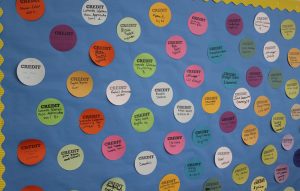
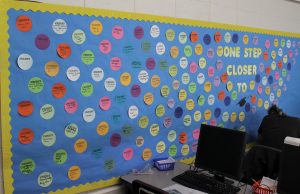
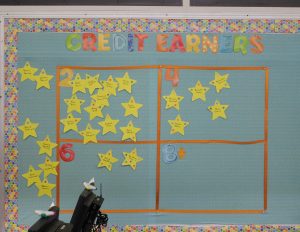
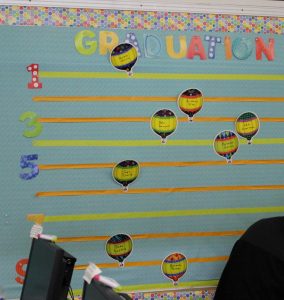
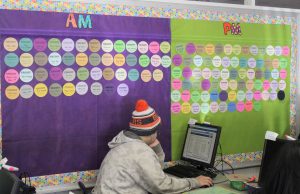
Students can take all of the core subjects required for graduation at Merit, and they can also get most of the elective classes there as well. Merit also offers such courses as Personal Finance and College and Careers.
Merit also offers P.E., which is taught partially through “Service Learning” on two Wednesdays per month. During service learning, students may go to such places as Ox Bow Park to clear trails, they may work for the Habitat for Humanity ReStore helping to move inventory, or they may volunteer at other agencies such as The Window, LaCasa, Church Community Services, and Love Way. Otherwise, their P.E. class sessions consist of swimming at GMS, yoga at Merit, walking in the school’s neighborhood, and going to The Post to lift weights, among other physical activities.
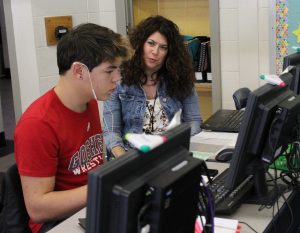
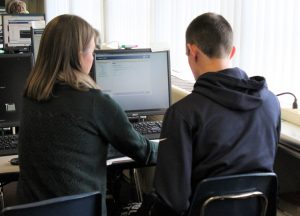
Besides supervising the students as they work on independent courses, the teachers are helping students to become more efficient online learners, and teaching them strategies to assist students in their work. Merit teacher Stephenie Ward stated that the Merit teachers have been working together in their Cluster and in Professional Development to find new ways to support and assist students as they work on online courses. And, as always, “we are building relationships with the students, to encourage and support them” with things such as attendance issues, motivation to finish their high school degree, family issues, stress, and possible anxiety issues.
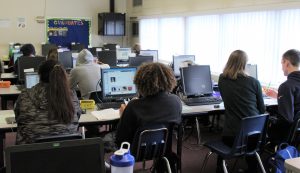
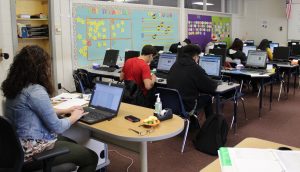
As seniors, the students as GHS and Merit are moving toward the end of the educational experience at GCS. They have learned the skills that GCS works to instill in all 12th grade learners: Strong fundamental academic knowledge and preparedness for tests such as the SAT and ACT, Personal and social skills needed for further education or the workplace, Future life direction determined with plans in place to achieve personal goals, Interaction and engagement with the community, and Effective communication and advanced technology skills. By the time GHS students graduate (which includes Merit students), they may have had up to 13 years with GCS; years full of encouragement, support, motivation, academic growth, opportunities and social maturation. The seniors are ready for whatever plans that they, along with the influence of their families, have made.
We hate to see our seniors leave GCS! But, we are always excited to see the ways in which they will leave their positive imprint on our society. They have grown, and they will be ready.
